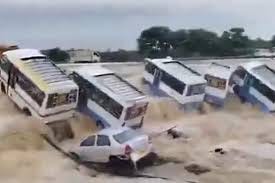Being Prepared for the Future: Resilience during Disasters
With disasters become intense and severe with each year we have to come out of our bubbles and become more prepared to survive these disasters to continue our way of life.
The recent wildfires in Los Angeles exposed the ill-preparedness of the affected for the disaster. Despite the area being prone to conflagrations, the event shocked the citizens mentally and materially. I was prompted to reflect on my own city and country. The conclusion I reached is that each citizen needs to receive disaster preparedness training or some basic survival training.
Climate change is only going to worsen and everyone must accept this fact. People live in their own private and social bubbles and are blissfully unaware of the reality that is taking place around them. The first step needs to be a change in mindset with regards to the climate and the realization that such events will only get more intense and destructive each year.
The next step would be disaster mitigation such as terrace gardens to reduce the intensity of heatwaves, increasing the green cover in cities, moving people away from certain mountainous regions, and away from the coast. This will at least reduce the number of lives lost. Even though houses may be destroyed, they can be rebuilt through support from the government and organizations.
The biggest step and the urgent need is for disaster preparedness to be made mandatory for all sectors. The education needs to include survival training which will correctly orient people and provide them the tools to survive disasters. The modules need to be institutionalized like the mandatory sexual harassment sessions or the social work or the joy-of-giving initiatives in corporate offices. Unless the course becomes mandatory, nobody will take it seriously. For those who are not working, various organizations, clubs, associations and so on can conduct the sessions. The scheme can become big business much like the sexual harassment sessions or mental health sessions have become. Many organizations and consultancies can be constituted to train people in various sectors, public, private, nonprofit.
People will grow to be more sympathetic towards disasters and contribute to organizations which are working to provide relief, rescue and rehabilitation to afflicted people. Survival skills training can begin in school itself with high school students learning basic survival techniques. They can also be initiated in colleges and universities and clubbed under life skills training. The hope is that disasters will bring people together and make them forget the various divisions and prejudices that separate them, and get through the disaster together. It is crucial and critical that everyone treats disasters as a community problem.



